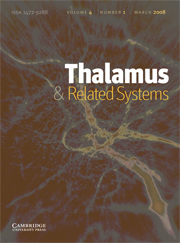Article contents
Pathways for emotions and memory I. Input and output zones linking the anterior thalamic nuclei with prefrontal cortices in the rhesus monkey
Published online by Cambridge University Press: 18 April 2006
Abstract
The anterior thalamic nuclei occupy a central position in pathways associated with emotions and memory [AMA Arch. Neurol. Psychiatry 38 (1937) 725]. The goal of this study was to determine the anatomic interaction of the anterior nuclei with distinct prefrontal cortices that have been implicated in emotion and specific aspects of memory. To address this issue, we investigated the relationship of input and output zones in the anterior thalamic nuclei linking them with functionally distinct orbitofrontal, medial, and lateral prefrontal cortices. We identified input zones by mapping the pattern and topography of terminations of prefrontal axons, and the output zones by mapping projection neurons in the anterior nuclei, after injection of anterograde and bidirectional tracers in distinct prefrontal cortices.
The results showed that the anterior nuclei were preferentially connected with some orbitofrontal and medial prefrontal areas. In contrast, the anterior nuclei had comparatively sparse connections with most lateral prefrontal cortices, with the notable exception of frontal polar cortex, which had moderate but consistent connections with the anterior nuclei. Prefrontal cortices were connected mostly with the anterior medial nucleus, though medial areas 32 and 25 as well as the frontal polar cortex were also connected with the anterior ventral nucleus. The zones of axonal terminations were more expansive than the sites with projection neurons in the anterior nuclei, suggesting extensive influence of feedback projections from prefrontal cortices. The results suggest that the anterior thalamic nuclei may act in concert with orbitofrontal and medial prefrontal cortices in processes underlying emotions and long-term memory, and with the frontal polar cortex in prospective aspects of working memory.
Information
- Type
- Research Article
- Information
- Copyright
- 2002 Elsevier Science Ltd
- 4
- Cited by

